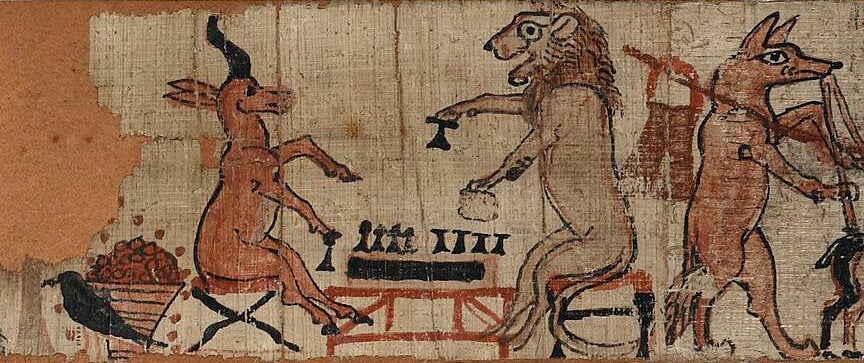In the long run, the ability of a species to evolve is more important than anything else in determining its competitive success. This is true almost by definition: given enough time, the ability to adapt and improve will overtake any initial disadvantage.
But evolutionary theory these last 50 years has been quite skeptical of “in the long run”. If it is driven to extinction because of a competitive disadvantage in the short run, then what matters if it has the potential to improve, eventually?
This has everything to do with aging. A population with aging has more diversity and a faster turnover compared to a similar population in which death is only due to famine, predators, disease, etc. So – in theory – a population with aging evolves more rapidly than a population that doesn’t age. But “the long run” can be thousands of lifetimes, and in the meantime those individuals that die early (of aging) are at a competitive disadvantage compared to those who continue to live, and have that much more time in which to produce offspring.
Can an aging population resist invasion (by longer-lived competitors) and cohere long enough that its superior rate of adaptation turns into a decisive advantage? This is the question that has been at the center of my research the last dozen years. On the one hand, there is abundant evidence that aging is no accident, that it has evolved via natural selection that explicitly favors aging. On the other hand, the theoretical argument casts doubt on the scenario where aging is selected on this basis.
The best resolution I have been able to find for this paradox is that aging has been able to evolve on this basis, and it is because the short-term advantage of unrestrained reproduction has been held in check by a different, faster-acting evolutionary principle than evolvability. Unrestrained reproduction leads to population overshoot, population crash, and extinction. This is a powerful, fast-acting evolutionary force, and populations have had to adapt by tempering individual competitiveness. This has created an environment in which the long-term advantage of aging is relevent, and aging as a population-level adaptation can thrive on this basis.
Here is a press release for an article of mine that will appear next month in American Naturalist, demonstrating mathematically how aging might be able to evolve, despite its individual cost, based on increased evolvability at the population level. (The cartoon is by my daughter, Maddy Ballard.)

Among members of the educated public, two views of aging predominate: One is that living things wear out like machines, suffering damage that accumulates over time. The other is that aging and death are programmed into the genes to assure space in the niche for the next generation to grow up.
But both these theories were discredited more than 100 years ago. As to the first, physicists say, “That’s not the way entropy works.” Concerning the second, evolutionary biologists will tell you, “That’s not the way natural selection works.”
So among specialists in evolutionary theory, there is a third theory: Aging did not evolve directly, but rode the coattails of genes that promote fertility early in life. In this paper, two physicists challenge the evolutionists, with a model that demonstrates how “making room for the next generation” might be a viable selection mechanism after all.
Of course, the fact that the model works this way does not imply that nature works this way. But the authors argue that their model explains recent genetic data much better than the standard theory, which was formulated before the modern science of genetics.
“Many genes that cause aging have now been identified in a number of species grown in the lab,” says Josh Mitteldorf, the paper’s lead author. “Most of these genes have nothing to do with fertility,” contradicting the mainstream evolutionary theory. “Some of these aging genes have ancient roots, going back to the first protozoa, a billion years ago. Any trait that has stuck around so long must have an adaptive function.”
“Aging is a classic case of a conflict between the individual and the community,” says author André Martins. “Going back to the 1960s, the evolutionists have a belief that in such conflicts, it is always the individual interest that prevails. Our model shows otherwise.” In recent years, computer models have played a central role in the rehabilitation of “group selection”, and both the authors have previously published computer models in which aging is able to evolve because the group benefit trumps the individual cost. Read the Article
Discover more from Josh Mitteldorf
Subscribe to get the latest posts sent to your email.

Congratulations, Josh. Nice synopsis, nice press release, nice cartoon from a talented daughter, and I’m sure a nice article too!
If we accept the mitochondrial free radical theory of aging; then aging began when the first eukaryote and mitochondrial bacterium joined in symbiosis. Evolution has been stuck with aging ever since from one-celled life up to humans. However, evolution can to some extent control the free radical leakage and damage for better or for worse, lengthening or shorting lifespans.
Ref: The Mitochondrion in Aging and Disease at Googlebooks (read the first chapter for free).
The free radical theory of aging has, in my opinion, been thoroughly discredited. Anti-oxidants shorten life span, and exercise lengthens life span by generating copious free radicals.
http://online.liebertpub.com/doi/abs/10.1089/ars.2006.8.582
I agree with you Josh. However, this shouldn’t lead to the misconception that antioxidants are bad. I think we can all agree that taking megadoses of any given antioxidant will not lead to any life extension at all. However, it is a scientific fact that, if you are defecient in one or more micronutrients, this will cause DNA damage and decades later show up as e.g. cancer. I don’t think anyone yet has discredited the triage theory (Dr. Bruce Ames). If you are dead, you are dead. It doesn’t really matter what the cause is.
Sorry, exercise reduces free radial production.